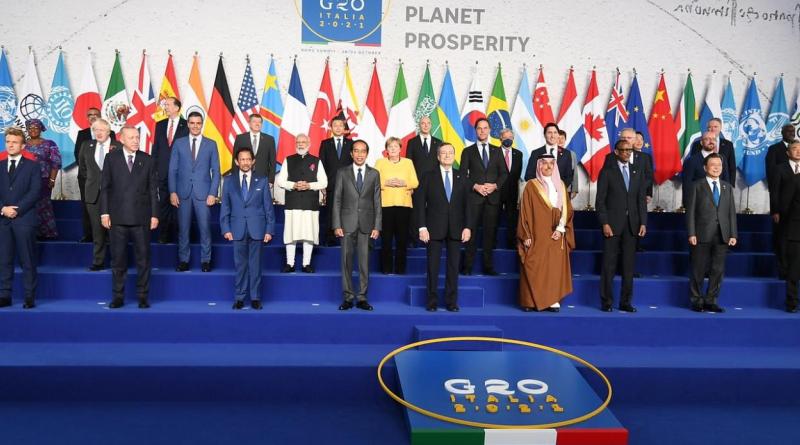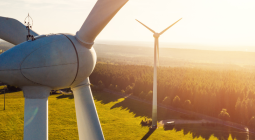6 Ways the G20 Can Maximize the Role of Forests in Climate Action

Despite current targets and commitments to combat climate change, global temperatures look set to increase by 2.4°C by 2100 — way above the Paris Agreement target. Climate action has never been more urgent, and in light of the impacts of the COVID-19 pandemic, a sustainable, inclusive and resilient recovery is also essential.
Natural forests have an important part to play as, when conserved, they contribute significantly to carbon removal; globally, forests represent around 25% of planned emissions reductions by 2030. Also, healthy forests provide food and livelihoods for 1.6 billion people — including around 400 million people who live within 1 kilometer of a forest in G20 Member States alone*. And to prevent future pandemics it’s important that forests remain healthy, as studies show that deforestation can lead to the spread of zoonotic diseases.
The G20 has a strategic role in conserving forests. The United Nations’ Food and Agriculture Organisation has stated that eight G20 members are among the top 10 countries with the largest forest area. In 2021, the G20 also declared a commitment to halt and reverse biodiversity loss by 2030.
However, challenges of deforestation and the disconnect between food policy and forest conservation remain. In Brazil, for example, forest conversion for agricultural commodities is a key driver of forest loss, while in Mexico, agriculture and livestock account for 80% of deforestation. In Indonesia, a study has shown that oil palm plantation and small-scale agriculture accounts for up to 40% of deforestation.
The 2021 Glasgow Leaders’ Declaration on Forests and Land Use, signed by 17 G20 countries at COP26, demonstrates a commitment to halt and reverse forest loss, promoting food security while conserving forests. But there is still some way to go for the G20 to strengthen this commitment. The last two G20 declarations in Rome (2021) and Riyadh (2020) did not explicitly mention the word “forest.” The upcoming G20 Summit in Indonesia, in October 2022, provides an opportunity to enhance G20 commitment to fully maximize the potential of forests for climate mitigation, food security and resilient pandemic recovery.
How the G20 Can Give Forests a Boost
To fully realize the role of forests as nature-based solutions for climate mitigation, food security and resilient pandemic recovery, G20 leaders should adopt these six measures:
1. Encourage legal commitment to minimize deforestation of natural forests.
The G20 should promote the need for stronger legal measures and encourage the streamlining of policies and actions on forest use and protection to curb deforestation. For example, in Argentina — despite having lost 10% of its Gran Chaco forest area over the last 20 years, it still plans to increase the number of cattle production up to 700,000 in the next decade.
In Indonesia, the recent establishment of the Job Creation Law raised questions on the rollback of environmental protections which may harm forests. And its recent Food Estate plan, aimed to secure food supplies, could put 1.5 million hectares of natural forests at risk of deforestation. The law, and plan, emerged despite Indonesia’s acclaimed forest moratorium policy in reducing deforestation to the lowest in five years in 2020. The recently increasing price of crude palm oil may further put forest conservation at risk in Indonesia.
2. Reiterate the goal to collectively plant 1 trillion trees by 2030.
This point was part of the G20 Rome Declaration, and its importance in creating new carbon sinks must be re-emphasized to improve both forest increase and governance. The G20 commitment to restoration is aligned to the UN Decade on Ecosystem Restoration, and as such some G20 countries have been working on major restoration activities: Indonesia has committed 600,000 hectares of mangrove forest restoration, South Africa has aimed to plant 3.6 million hectares of forest and land areas since 2017, and China has plans for 30% forest coverage of land by 2050. The G20’s collective restoration target will strengthen the global pursuit of trees and forests as nature-based solutions for climate change.
3. Promote food system transformation that aligns with social and environmental safeguards in association with forest ecosystems.
The High-Level Panel of Experts on Food Security and Nutrition in 2017 suggested recognizing nuanced, multiple pathways linking forest conservation and food security — including the importance of forest ecosystem services and subsistence for local communities. There are emerging practices and efforts within G20 countries in this area, which must be supported further through relevant policies.
In Indonesia, for instance, some local communities collect fruit and sweet potatoes from forests as alternative source of food, and adopt agroforestry systems to reduce soil erosion. Meanwhile, initiatives such as the Food and Land Use Coalition develop science-based solutions and policy dialogue to encourage food system reform to tackle climate and poverty challenges — including in G20 countries such as Australia, Germany, the United Kingdom and India.
4. Ensure the rights and participation of Indigenous peoples and local communities within forest ecosystems.
Indigenous and local communities help de-escalate climate change and biodiversity loss. Their role and importance in natural resources, including forest, management are recognized in several platforms, such as the Convention on Biological Diversity, the UN Declaration on the Rights of Indigenous Peoples, and the International Union for Conservation of Nature nature-based solutions principle.
Indigenous peoples and local communities’ rights can be safeguarded by allocating forest area permits for conservation and sustainable use, and implementing a robust legal framework to protect Indigenous environmental rights.
5. Improve values and market demand of non-timber forest products (NTFPs) and services.
In general, the potential of NTFPs remains largely untapped, hence its contribution to incomes has been limited. This is unfortunate because NTFPs are key to supporting food security and rural livelihoods in low- and middle-income countries.
One study in Indonesia shows NTFPs account for as much as 53% of the income of communities around the forest. The G20 could therefore promote joint measures to enhance NTFPs value chain and market demand, while also ensuring mechanisms for sustainable product harvesting to avoid over exploitation. This would give much needed support — not just for the preservation of natural resources but also in promoting inclusive economic growth by reducing inequalities in urban/rural areas, and rich/poor countries.
6. Establish policy for nature-based carbon credits that upholds environmental and social safeguards.
The G20 includes several countries with strong nature-based credits potential from forests — such as Indonesia, Brazil and India — as well as industrialized countries that may use nature-based credits for carbon offsets. These credits have only been recently included in compliance carbon markets, where the governing rules remain uncertain.
In line with the emerging needs for high-quality nature-based credits, it's important to have a policy that encourages the creation of carbon credits from forests in G20 countries that preserves biodiversity, provides equitable socio-economic benefits to local communities, and ensures environmental integrity (such as addressing the issues of double counting, among others).
How Indonesia Can Lead by Example in the G20 Presidency
During Indonesia’s G20 Presidency in 2022, it must show how to advance forest-based climate actions. This has already started through discourse and rhetoric: At the 2021 G20 Summit, Indonesia’s President Joko Widodo stated his intention for the G20 to lead the world in tackling climate change, and emphasized the country’s strategic position given one of its largest assets in the world are tropical forests.
This has become more relevant since the release of 2022 IPCC Climate Change Mitigation Report, which highlights that holding global temperature to 1.5 degrees C is still possible, but only if we urgently act now.
More than ever, these words must be turned into action. To lead by example, Indonesia must:
- Double down on its ambition to halt and reverse the deforestation of natural forests. Indonesia’s step in permanently extending permit moratorium policy in primary forests and peatlands should be applauded. To enhance this ambition, the country can consider expanding the moratorium to include secondary natural forests and mangroves — both of which can contribute toward emissions reductions and community livelihoods.
- Accelerate the provision of Social Forestry permit provision to local communities. Until 2021, the provision only reached up to 40% of the 12.7 million hectare target by 2024 in Indonesia. A proactive role to fill the provision gap is needed. Indonesia must mobilize more resources to work with local forest communities in obtaining the permit. Further, for those who have obtained this permit, Indonesia must incentivize communities and build their capacity to pursue sustainable livelihood options and safeguard the forests.
- Pursue food production systems that preserve forest ecosystems. Indonesia needs to find alternative ways of producing food without causing land conversion. One way to achieve this is by putting more emphasis on the improvement of the production and consumption of local food. Transforming our diet to be focused on consuming locally has the potential to reduce GHG emissions, reduce food loss during transportation, and help to shorten the food-supply chain. Eating locally also means diversifying our food sources, for example consuming forest-based food while at the same time promoting the protection and restoration of the sustainable use of forest ecosystems.
- Stimulate and incentivize non-wood products and services from Indonesia’s natural forests. Indonesia should rally other members of G20 by championing four cross-cutting enablers/accelerators: technology, innovation, data and governance in all programmatic interventions to accelerate impact while minimizing trade-offs. This is necessary to encourage a strategic and systems-oriented approach to generate sustainable impacts in the future.
- Set up the regulatory framework to ensure high-quality nature-based credits. Being regarded as a "carbon superpower" — thanks to their forests, peatlands and mangroves, among others — Indonesia could set the tone of what defines high-quality nature-based credits in practice. To start, Indonesia should develop a robust framework on credit verification and validation, safeguarding environmental and community benefits, and aligning the crediting mechanism with ambitious emissions reduction targets. The framework development should ensure effective participation from targeted companies, local forest communities, NGOs and other entities. Indonesia should also scale up the lessons learned from local-level carbon credit projects.
Looking ahead, G20 leaders must strengthen their commitment and actions to reverse and halt deforestation and promote truly environmentally sustainable forest-based food resilience and recovery. Indonesia, hosting the G20 in 2022, should use this moment of leadership to enhance G20 commitment on forest conservation and restoration, while also leading by example through strengthening its own forest governance.
ENDNOTE: *Approximation provided excludes the European Union.
By Rizky Haryanto, Dean Affandi and Smita Tanaya Cover Image by: MEAphotogallery





